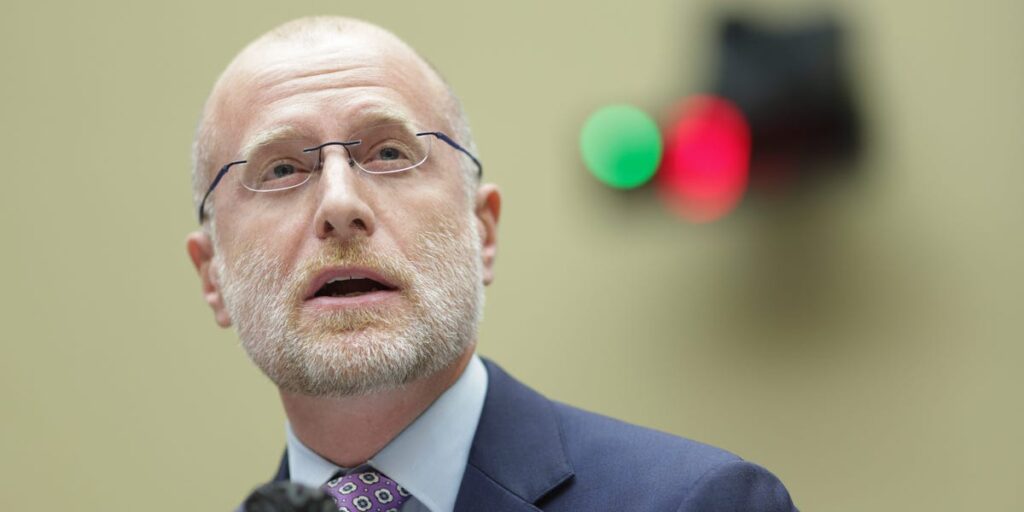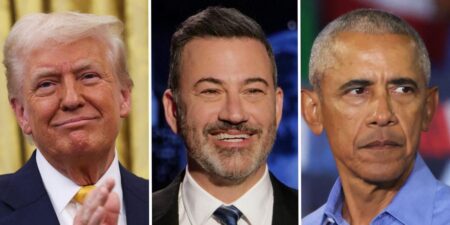Brendan Carr didn’t order ABC to suspend Jimmy Kimmel, but the Federal Communications Commission chair got the outcome he wanted.
Kimmel, a late-night host who’s long criticized and mocked President Donald Trump, had his namesake show on ABC suspended “indefinitely” after his comments about Charlie Kirk, the right-wing influencer who was killed in public last week.
Carr, a Trump appointee, suggested on a conservative podcast on Wednesday that owners of local broadcast stations that license ABC programming should pressure the network to cancel Kimmel. He said broadcasters who don’t act “in the public interest” could get their licenses reviewed.
It wasn’t the first time Carr had picked a fight with a major broadcaster. The FCC held up Skydance’s acquisition of Paramount for months after Trump sued CBS News, a subsidiary of Paramount, claiming that a “60 Minutes” interview with Kamala Harris was deceptively edited. Paramount settled for $16 million in July. The FCC approved the deal a few weeks later.
With Kimmel, Carr once again got the result he wanted. Hours after Carr’s critique, ABC pulled Kimmel’s show after pressure from two major companies — Nexstar Media Group and Sinclair — that own local ABC affiliate stations.
An FCC commissioner pressuring local broadcasters into speaking up against a network is like “nothing we’ve confronted before in our modern day,” said Al Tompkins, a journalism professor at Syracuse University.
While it may be new, it’s also part of a pattern of Carr using his power in aggressive and novel ways at the helm of the FCC, from threatening to pull broadcast licenses to delaying a deal and investigating DEI practices.
Carr’s maneuvering has led to some blowback. For example, FCC commissioner Anna Gomez, a Biden appointee, criticized Carr for politicizing the agency in a statement on Thursday.
“This FCC does not have the authority, the ability, or the constitutional right to police content or punish broadcasters for speech the government dislikes,” Gomez said.
Carr and his spokesperson didn’t respond to requests for comment.
How Carr is expanding the FCC’s influence
Carr’s actions show the FCC’s particular power over broadcast TV, as opposed to cable and streaming, where it lacks authority.
The FCC issues broadcast licenses to stations and can revoke them if they are not operating in the “public interest.”
Historically, the FCC has usually focused on limiting explicit content like nudity and swearing, Tompkins said. A high-profile example is the FCC fining CBS for broadcasting “indecency” after Janet Jackson’s wardrobe malfunction at the 2004 Super Bowl, said G.S. Hans, a clinical professor of law at Cornell Law School.
The FCC’s public interest language “isn’t super powerful,” which is why the government usually gets specific with its rebukes, Hans said.
Revoking a broadcast license is extraordinarily rare. One of the few successful attempts was when the FCC revoked the licenses for WLBT-TV, a local station in Jackson, Mississippi, that refused to cover the Civil Rights movement in the 1960s. Another was when a Jacksonville TV station owned by the Washington Post came under pressure after reporting a racist comment from a former Supreme Court nominee of President Richard Nixon. The effort went nowhere, and the next year, Nixon resigned.
“Renewal is almost always automatic,” said Gigi Sohn, who was nominated by former President Joe Biden for FCC commissioner but withdrew after facing political pressure.
The mechanics of getting ABC off the air would be tricky, since broadcast licenses belong to local affiliate stations instead of the network itself. That means the FCC would have to revoke licenses from hundreds of stations across the country, which would be time-consuming.
Still, Rick Edmonds, a media business analyst at the Poynter Institute, said the FCC has other ways of pressuring broadcasters, such as holding hearings or commissioning studies. Carr has also gone down other routes, like investigating Disney and NBCUniversal parent Comcast for their DEI practices.
And as Paramount learned the hard way, the FCC can stand in the way of mergers.
Nexstar is attempting to acquire rival Tegna, and the FCC must approve the deal. The tie-up would likely require a rule change, since TV station owners can’t increase ownership to more than 39% of US households. To consummate its deal, Nexstar needs to be in the FCC’s good graces.
“They certainly don’t want to be crossways with Carr,” Tompkins said of Nexstar.
Beyond concerns about the FCC, companies like Nexstar can also face pushback from red-state viewers over highly politicized late-night shows, Tompkins added.
A new era of pressure
The FCC’s “public interest” clause has historically been applied very cautiously, and rarely to censor political content, said Seth Stern, the director of advocacy at Freedom of the Press Foundation.
“The law has never been interpreted to give the FCC this kind of authority over particular programs (or their hosts), and in fact provides just the opposite,” said Bob Corn-Revere, the chief counsel at the Foundation for Individual Rights and Expression.
That may be beside the point. Even if Carr doesn’t actually attempt to revoke licenses, his rhetorical pressure sends a signal.
Sohn, who’s now a senior fellow at the Benton Institute for Broadband & Society, said Carr is using his position as a “bully pulpit.”
“It doesn’t really matter what the exact powers are,” Poynter’s Edmonds said. “It’s a kind of signal, and a threat.”
Read the full article here
















